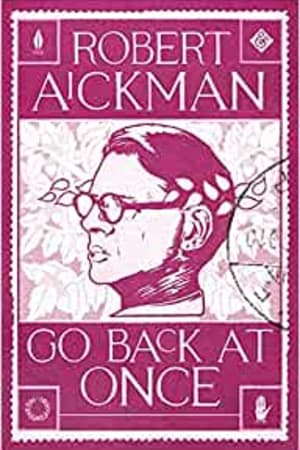Literature & Fiction
- Publisher : And Other Stories
- Published : 11 Jan 2022
- Pages : 400
- ISBN-10 : 1913505200
- ISBN-13 : 9781913505202
- Language : English
Go Back at Once
Completed by Robert Aickman in 1975, but never before published in the US and not widely in the UK, Go Back at Once is a delicious, delirious comic fantasy about the joys and terrors of a life devoted to resisting the degradations of our technological and conformist age. It tells the story of Cressida Hazeborough and her friend Vivien, two cuttingly intelligent young women in a misty, inter-war Britain. The pair have little patience for the company of the marriageable men they are meant to endure, yet neither do they possess the means to live as they might wish: together, and apart from the demands of modern society. What's a girl to do?
Having left school and taken the sorts of London job available to women of their age and station, remarkable arrives: a great foreign poet, playwright, athlete, and soldier named Virgilio Vittore has successfully conquered the tiny country of Trino, on the Adriatic Sea, and is now governing it "according to the laws of music." Could this new utopia be a refuge for Cressida and Vivien, and indeed all who seek a life less ordinary? Or should the women, having arrived in this chaotic land, where love, life, and politics must submit to the rules of the beautiful, take to heart the advice of the novel's title?
Snobbish yet humane, reactionary yet camp, strait-laced yet queer, personal yet theatrical, old-fashioned yet radical, Go Back at Once reveals Robert Aickman as a master not only of the "strange story," but a romantic pessimist of the first order, deserving of a place beside the works of Evelyn Waugh, Anthony Powell, or even Edward Gorey.
Having left school and taken the sorts of London job available to women of their age and station, remarkable arrives: a great foreign poet, playwright, athlete, and soldier named Virgilio Vittore has successfully conquered the tiny country of Trino, on the Adriatic Sea, and is now governing it "according to the laws of music." Could this new utopia be a refuge for Cressida and Vivien, and indeed all who seek a life less ordinary? Or should the women, having arrived in this chaotic land, where love, life, and politics must submit to the rules of the beautiful, take to heart the advice of the novel's title?
Snobbish yet humane, reactionary yet camp, strait-laced yet queer, personal yet theatrical, old-fashioned yet radical, Go Back at Once reveals Robert Aickman as a master not only of the "strange story," but a romantic pessimist of the first order, deserving of a place beside the works of Evelyn Waugh, Anthony Powell, or even Edward Gorey.
Editorial Reviews
"In Aickman's fiction, peculiarity is intertwined with a drab twentieth-century realism that is very English and sometimes dryly funny. Think Philip Larkin, or Barbara Pym, gone eldritch." ―Anwen Crawford, The New Yorker
"His name should be placed among the greats―Flannery O'Connor, Irwin Shaw, Raymond Carver . . . You will never forget the first Aickman story you read, nor be satisfied when you've read them all." ―John Darnielle, author of Wolf in White Van
"Unsettling is a key description for Aickman's writing, not merely in the sense of creating anxiety, but in the sense of undoing what has been settled: his stories unsettle the ideas you bring to them about how fictional reality and consensus reality should fit together . . . He was drawn to ghost stories because they provided him with conventions for unmaking the conventional world, but he was about as much of a traditional ghost story writer as Salvador Dalí was a typical designer of pocket watches." ―Matthew Cheney, Electric Literature
"His name should be placed among the greats―Flannery O'Connor, Irwin Shaw, Raymond Carver . . . You will never forget the first Aickman story you read, nor be satisfied when you've read them all." ―John Darnielle, author of Wolf in White Van
"Unsettling is a key description for Aickman's writing, not merely in the sense of creating anxiety, but in the sense of undoing what has been settled: his stories unsettle the ideas you bring to them about how fictional reality and consensus reality should fit together . . . He was drawn to ghost stories because they provided him with conventions for unmaking the conventional world, but he was about as much of a traditional ghost story writer as Salvador Dalí was a typical designer of pocket watches." ―Matthew Cheney, Electric Literature


